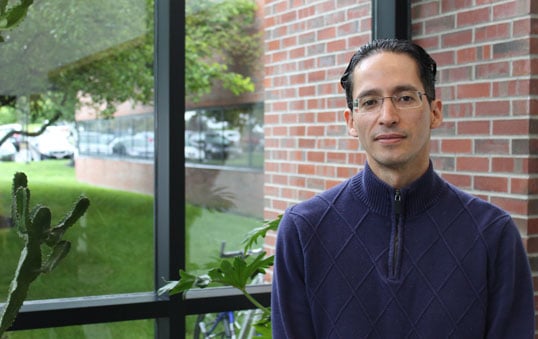 |
|
| Alejandro Vasquez-Rifo, PhD, was named one of nine 2014 Pew Latin American Fellow in the Biomedical Sciences by The Pew Charitable Trusts. |
Postdoctoral scholar Alejandro Vasquez-Rifo, PhD, was named a 2014 Pew Latin American Fellow in the Biomedical Sciences today by The Pew Charitable Trusts. By providing flexible funding and networking opportunities, the Pew Latin American Fellow program allows early-career scientists from Latin America to train in top U.S. laboratories and develop skills and connections that will help them become scientific leaders in their home countries. Dr. Vasquez-Rifo joins nine other researchers named to this year’s class.
“Being named a Pew Latin American Fellow is an incredible honor and a huge opportunity for me,” said Vasquez-Rifo, who is doing research in the lab of Victor Ambros, PhD, the Silverman Chair in Natural Sciences and professor of molecular medicine. “The Pew Fellow is unique in that it provides postdoctoral scientists the opportunity and financial support needed to pursue independent research when they return to their home countries.”
Latin American Fellows receive salary support during two years of postdoctoral training in laboratories led by prominent U.S. scientists. They are given an additional award if they return to their home countries at the end of the fellowship. More than 70 percent of fellows have used this incentive to establish their own laboratories in Latin America.
Alumni of the Latin American fellows program have leveraged their training in the U.S. to become mentors to others. Many now hold positions of leadership in research institutions across the globe.
“The Pew program makes it possible for me to return to South America and potentially establish my own lab,” said Vasquez-Rifo. “If I could return and serve as a mentor to others pursuing science as a career, that would be a wonderful thing.”
With the Pew support, Vasquez-Rifo will explore how physiological stresses, such as starvation or infection, can trigger an “emergency response pathway” that switches on a broad range of genes that help the organism survive. One way cells can coordinate the activity of these genes is via the generation of small regulatory ribonucleic acids (RNAs), called microRNAs.
Using an array of cutting-edge techniques in molecular and cell biology, genetics and computation, Vasquez-Rifo will evaluate whether the stress of feeding C. elegans an infectious bacterium, rather than the harmless bacteria it normally eats, changes the worms’ overall production of microRNAs, or whether there are specific microRNAs that are synthesized to handle this danger.
Findings from his work could point the way toward therapeutic intervention for a variety of conditions that are thought to be precipitated by increased cellular stress, including cancer and aging.
Vasquez-Rifo earned his bachelor’s degree in biology in his home country at the National University of Colombia. He received a doctorate in cellular and molecular biology in 2013 from Laval University in Canada, where he worked with Martin Simard, PhD, associate professor of molecular biology.
Pew’s Latin American Fellows program began in 1991 and operates alongside the Pew Scholars Program in the Biomedical Sciences, which has fostered early-career innovation by U.S. scientists since 1985. The Fellows program has invested in more than 200 young scientists from across the region, including postdoctoral researchers from Argentina, Brazil, Chile, Colombia, Ecuador, Mexico, Nicaragua, Peru, Uruguay and Venezuela.
Researchers are selected by a national advisory committee composed of renowned scientists, including Chairman Torsten N. Wiesel, MD, president emeritus of Rockefeller University and a 1981 Nobel laureate in physiology or medicine.
UMMS Pew Latin American Fellow in the Biomedical Sciences include:
- 2014: Alejandro Vasquez-Rifo, PhD, postdoctoral scholar, and
- 2012: Juan I. Fuxman Bass, PhD, postdoctoral scholar.
UMMS Pew Scholars Program in the Biomedical Sciences recipients include:
- 2014: Brian A. Kelch, PhD, assistant professor of biochemistry & molecular pharmacology;
- 2011: Thomas Fazzio, PhD, assistant professor of molecular medicine;
- 2010: David Guertin, PhD, assistant professor of molecular medicine;
- 2005: Lambertus van den Berg, PhD, associate professor of molecular medicine;
- 2000: Phillip D. Zamore, PhD, Howard Hughes Medical Institute Investigator, the Gretchen Stone Cook Chair of Biomedical Sciences and professor of biochemistry & molecular pharmacology;
- 1995: Craig C. Mello, PhD, 2006 Nobel Laureate, Howard Hughes Medical Institute Investigator, the Blais University Chair in Molecular Medicine and distinguished professor of molecular medicine and cell biology; and
- 1992: John M. Leong, MD, PhD, professor of microbiology & physiological systems.